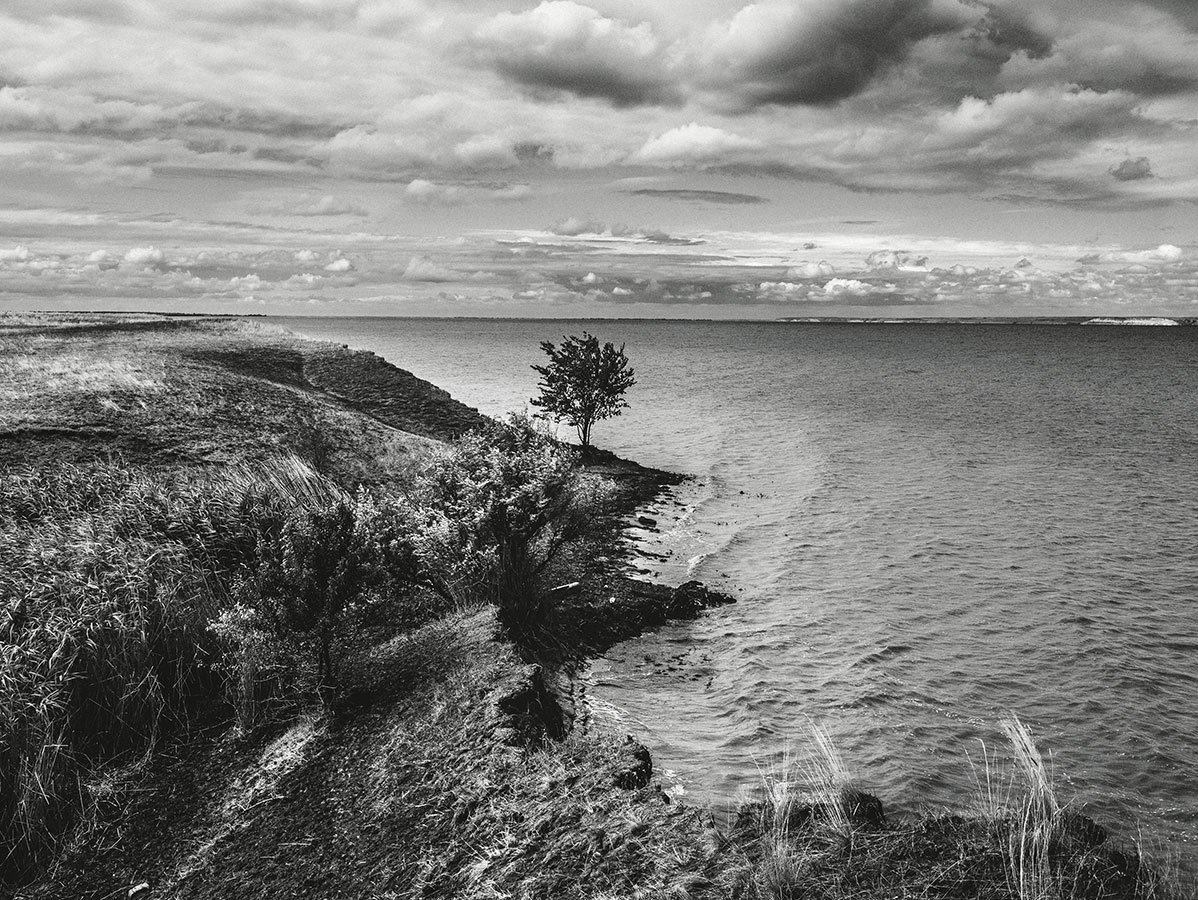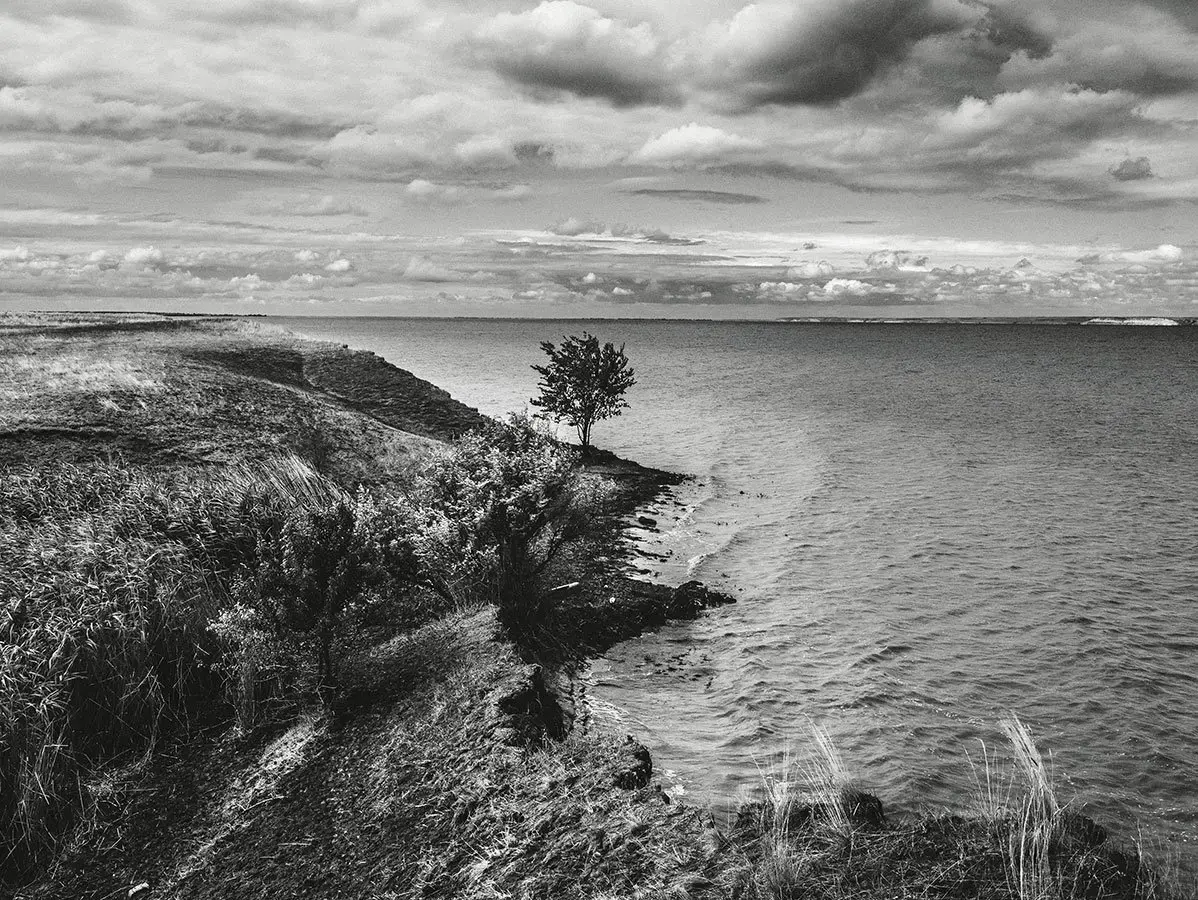
Caviar, counterculture, and the cult of Stalin reborn
Russia has become, to observers in the West, a distant, mysterious, and hostile land once again. It seems implausible, in the age of social media, that so little should be known about the country that has shattered the international order, but the shadows surrounding Russia have only grown since the days of the Soviet Union. Of course, it is one thing to observe the country from the outside; it is another to try to understand how Russians experience the war and react to sanctions from within, and what they hope the future holds. If Russia seems to have become another planet, it is largely because its regime has also waged war on foreign journalists, preventing them from straying beyond established perimeters.
Over the summer, hoping to do precisely that, I spent a month traveling down the Volga River. In a land of great rivers, the Volga is the river. They call it matushka, the mother; it flows from the Valdai Hills to the land of the Chuvash, the Tatars, the Cossacks, the Kalmyks, and into the Caspian Sea. It’s where Europe and Asia meet or part, are bridged or blocked, depending on whether the compass of Russian history is pointing east or west. It’s where it all started, after all, where the empire took root: Along the river one finds many of the cities that have established Russian culture and faith—from Ulyanovsk, the birthplace of Lenin, to Stalingrad (now called Volgograd), the site of the infamous World War II siege. This is a history that weighs heavily on Russian identity today, as the country continues to look backward, sifting its vaunted past for new myths of grandeur. It seems prepared to resist and to suffer, acts at which Russians have always excelled, and to have resigned itself to a future of isolation, autocracy, and perhaps even self-destruction.

As a nonprofit journalism organization, we depend on your support to fund more than 170 reporting projects every year on critical global and local issues. Donate any amount today to become a Pulitzer Center Champion and receive exclusive benefits!
Before starting down the river, I met with Mikhail Piotrovsky, who is an old acquaintance and the director of the State Hermitage Museum in Saint Petersburg, in his office on the museum’s ground floor, where he has carved out a space for himself among piles of books, stacks of paper, and various sculptures. The photographs crowding the room, of him with eminent Western leaders—a smiling Tony Blair and Queen Elizabeth—are now themselves relics, not unlike the tapestry of Catherine the Great hanging above his desk.
I asked him about the river. “The Volga was everything, and is still everything,” he told me. “Because it makes you aspire to greatness. It has a sort of intimacy, sheltering and bright skies, not like the wide-open spaces of the steppe or Siberian rivers, which make you feel like a speck in the cosmos.”
Piotrovsky is an illustrious scholar of Arabic studies. I’ve known him for years, but we would normally talk about Canaletto and Byzantium, the great Islamic explorers and his beloved Sicilian wines. This time I found him in full war fervor. And, I was convinced, it was not only to defend his prestigious position: At his age, seventy-nine, he could easily keep his head down and carry on quietly, like most Russians have elected to do. He spoke with his usual calm but looked feverish, as if something were devouring him from the inside.
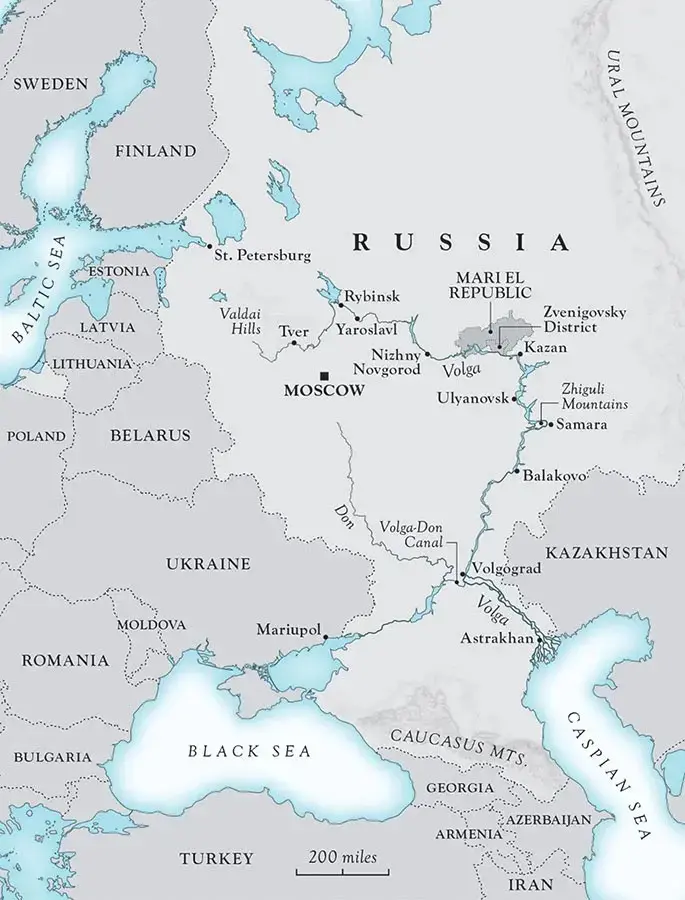
Piotrovsky, who is mild-mannered and cerebral, and who wore his jacket loosely over hunched shoulders, seemed to have become a warrior. “Russia is many people, but one nation,” he asserted. “Russia along the Volga was able to incorporate everyone. Islam is just as much a religion of Russian tradition and identity as is Christian Orthodoxy. In Europe, in America, you speak of nothing but multiculturalism, but your cities are bursting with hate. For us, it didn’t take much to include everyone, because we’re an imperial civilization.” Then he grew more animated. “Look at the Hermitage!” he said, opening his arms to the room around us, widening his eyes. “It’s the encyclopedia of world culture, but it’s written in Russian because it’s our interpretation of world history. It may be arrogant, but that’s what we are.”
He took a deep breath, and began to talk of Stalingrad, his Jerusalem. “I don’t call it Volgograd, but Stalingrad,” he clarified for my sake. “It is our reference point now more than ever, an unparalleled symbol of resistance, our enemies’ worst nightmare. During the Great Patriotic War, we used it to defend the Volga as a vital corridor.” He continued to press the analogy: “And it’s been the same in the last few months. The Volga and the Caspian feed our trade with Iran to oppose the sanctions, while we use them to export oil to India and import what we need.” He removed his glasses and cleaned them with his jacket. “Stalingrad is a lucky charm, it’s destiny. If the Nazis had taken it, they would have cut off the Volga and conquered all of Russia. A very material thing that became spiritual. A warning. Whosoever tries it will meet the end of all the others—Swedes, Napoleon, the Germans and their allies.” He went on. “Russians are like the Scythians: They wait, they suffer, they die, and then they kill.”
I would think back to this meeting often over the course of my trip; following the river, I recalled the odd look in Piotrovsky’s eyes and felt the echo of his words. In fact, when I visited a sturgeon farm in Astrakhan, in the Volga Delta, I saw that his view was, in certain respects, correct. Olesia Sergeeva, a biologist who heads the company that owns the farm, reiterated the importance of the ongoing trade between Iran and Russia. In her own small way—I mean this only as a figure of speech; Sergeeva supplies the Kremlin with caviar—she skirted the sanctions, buying feed from Iran instead of Europe, as she had done before. She spoke of this as if it were public knowledge. “Everything passes through here,” she said. “They’re building new docks on the delta for container ships and oil tankers.”
Sergeeva took me to see the Jewish, Armenian, and Iranian neighborhoods of Astrakhan. An exhibition of photographs highlighting the civilian volunteers supporting the military was being set up outside of a park. At sunset, the elegant riverfront was swarmed with families and groups of young people talking and laughing in hushed tones. Couples sat on railings eating watermelon while food stalls projected multicolored lights on the Volga. There was a fin de siècle quality to the atmosphere, curls of smoke emanating from shashlik grills, a warm breeze delivering the lament of a distant violin. No military uniforms in sight.
The café façades and the wrought-iron balconies reminded me of New Orleans. Sergeeva pointed out the renovations along the canal that runs through the old town, indicating the nineteenth-century wooden villas that will soon become hotels and luxury homes. “They seemed destined to crumble,” she said. “But now that money is going around, Astrakhan is once again the gateway to European Russia, Central Asia, and India. This is how it is for now. Later, we’ll see.”
On the delta, which fans out for sixty miles before reaching the Caspian Sea, pairs of fighter jets zoomed by at low altitude. I tried catching a glimpse of customs at the commercial port, but I couldn’t see past the checkpoints, and the tourist port was closed. Even the ferry was no longer in service. But one could still see cranes loading and unloading a dozen cargo ships, and three barges waiting at the widest point. Sixty-three miles long, the Volga–Don Canal was built under Stalin with the labor of seventy-five thousand prisoners, and opened in 1952. It is part of the waterway that connects the Volga to Rostov on the Don River, from which one can reach Mariupol, which is now controlled by the Russians. South of Volgograd, I tried taking a dirt road leading to the mouth of the canal but was intimidated by the presence of a helicopter hovering some three hundred feet above me. I decided instead to gather wild strawberries.
In Astrakhan, it was rumored that the Iranians had invested billions in the development of the Caspian-Volga-Don corridor. There was talk of trafficking agricultural products and oil, but also turbines, spare mechanical parts, medicine, and nuclear components. I couldn’t verify this, but it was clear that Astrakhan is central to the anti-Western economic bloc’s efforts to turn east.
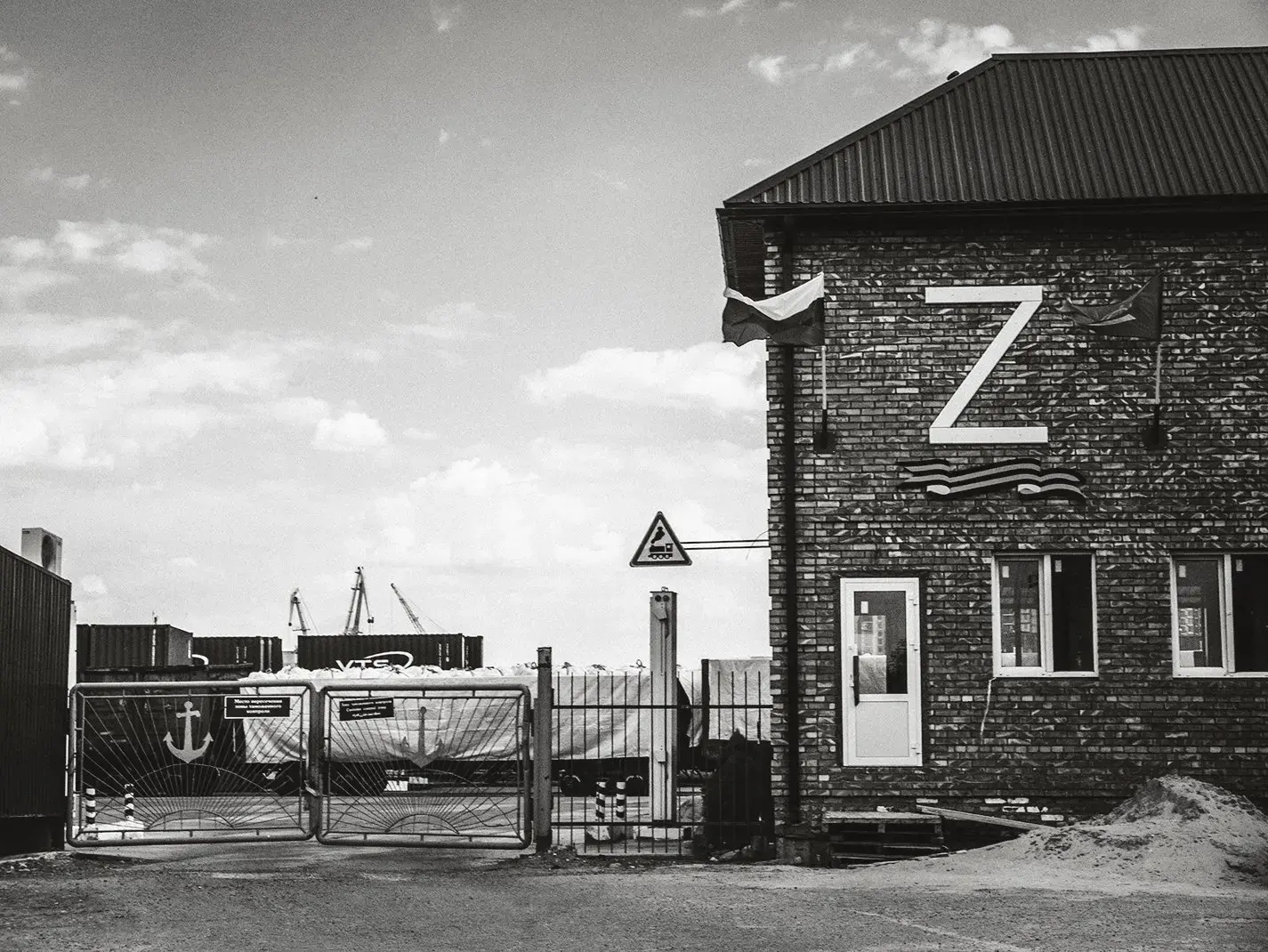
Sergeeva’s caviar is refined and humanely produced. She explained that this was the result of a process that she had invented: She extracts the eggs from the sturgeon with a small incision, without killing it. This procedure can be performed three times on the same fish. She has endeavored to ensure that the production and sale of her caviar remains the same as it was before the war. “In Russia it’s not a real party unless there’s caviar,” she said—even, apparently, in the current situation. She told me that since Russia had banned wild sturgeon harvesting in the Caspian, farms in this Volga region have proliferated, their numbers rising from three to sixty in the past five years.
Sergeeva is well-traveled and known widely for her aquaculture expertise. She could get a job anywhere, it seemed to me, so why stay? “I was born here, I studied here, my husband is Russian, my son is Russian, I’m Russian,” she said. “I wouldn’t say I’m a patriot, and I don’t want to express my thoughts on Putin and the war. But I can assure you that my life hasn’t changed. Not in the least.” She blushed as she spoke, as if the subject were uncomfortable. “The Russians are reacting to the sanctions in an extraordinary way, even with a weak ruble and the inevitable inflation. The prices of essential goods have held steady. And now we’re consuming better and healthier products than before the war, even exceptional cheeses.”
I had never imagined that the rise of hyperlocal food would be one of the recurring themes of this trip. But it appears that the Western sanctions and war economy have intensified a traditional Russian gastronomy movement. Western products had piqued the palates of average urban Russians, and local producers were trying to fill their vacuum, proudly offering Russian-made Camembert and prosciutto, as if to provide some material evidence of Russkiy Mir, Putin’s ideology of Russian supremacy. As I dined along the Volga, menus often specified the farms from which ingredients had been sourced. Restaurants served svekolnik and okroshka, simple cold summer soups, exalting the quality of local radishes grown without Western fertilizers.
And fishing has largely ceased in Rybinsk, the city once known as the fishery of the tsar. Instead, the area has reinvented itself as something like the oven of Moscow. Every day, trucks set off for the capital full of warm loaves. Bakeries abound: Wheat and rye farming in the region has increased by 40 percent.
Among the first to fire up an oven was fifty-four-year-old Andrei Kovalev, who knew nothing about baking bread until three years ago. “I learned to use zakvaska, a bread starter,” he told me in his large bakery in the Red Square of Rybinsk, where a statue of Lenin replaced one of Alexander II and has loomed ever since. Kovalev was popular among the locals—he hands out samples to passersby, sporting a beard and a rough tunic made of linen and burlap. He saw opening a bakery as a political act, one salvaging rural Russian values “against consumerism copied from America,” as he put it. “Over the past thirty years people hated Russian bread,” he said, “they thought it was beneath them. They wanted baguettes, the little brats! Mine are old recipes, from long before the perestroika, from back when we were happy.”
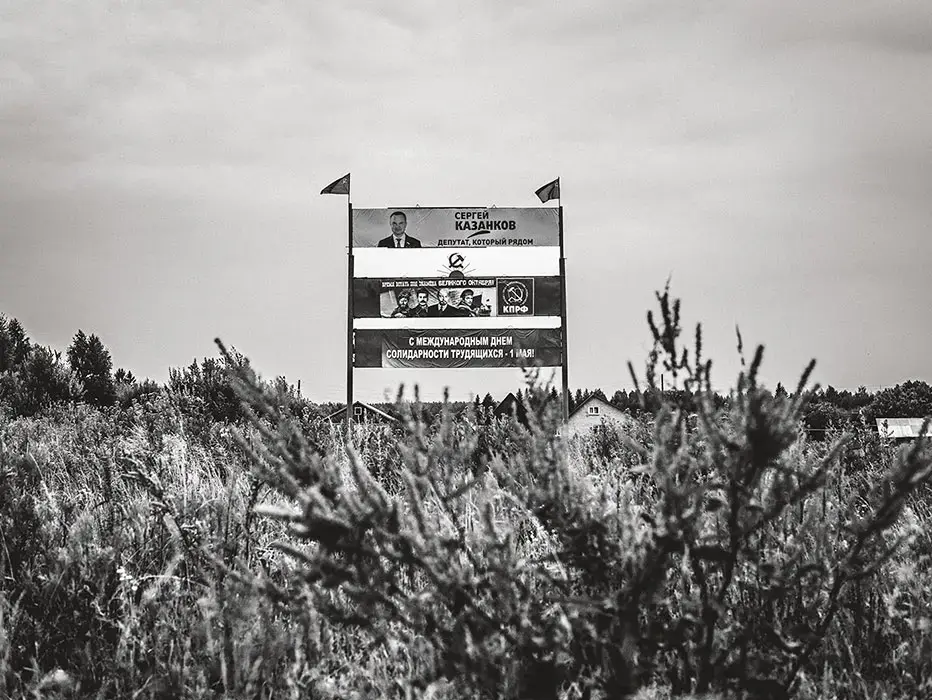
Had it not been for a massive poster looming over a lonely intersection in the steppe, showing Sergei Kazankov alongside Lenin and Stalin, I might have missed another quite surreal thing: Soviet Union revivalism. Using a VPN to protect my online searches, I learned that Kazankov had been reelected to the State Duma in 2021 as a Communist, that he was sanctioned for supporting the invasion of Ukraine, and that his father, Ivan Kazankov, has long been a Communist power broker. Sergei himself had been the director of a meat-processing plant and agricultural combine in the Zvenigovsky District, owned by his father.
By this point I was traveling across the Mari El Republic, some ninety miles from Kazan, the capital of the Republic of Tatarstan. More specifically, I was in the Zvenigovsky District, which lends its name to Kazankov’s company, Zvenigovsky LLC, which has become known in town as the last sovkhoz, or large-scale collective farm. I had only to make a small detour, cross a field of sunflowers, and get directions at a gas station (“when you see the monument to Marx you’re practically there”) to arrive at its building, which, on first glance, seemed like a memorial to the old Soviets. The red flag of the USSR fluttered above the white and yellow complex. According to the company, it’s the same size as the one lowered from the Kremlin on December 25, 1991, when Communism fell. The walls of the plant were covered in red inscriptions marked by the exclamation points the Bolsheviks had so loved to use: “Honor and glory to the workers of the Zvenigovsky combine!”; “Comrades, let us fight for our village, let us fight for Russia!”; “Now and forever, war on Fascism!”
The road to the entrance was lined with modern Stakhanovite-esque photographs, presenting, for instance, one worker as the best sausage stuffer, another as the best tractor driver, and a final one, sporting a mustache and a Nike T-shirt, as the mechanic of the year. Trucks and vans marked with a hammer and sickle poured out of the gates. A statue of Stalin presided over it all, his pants tucked into his boots from his place on a four-tiered pedestal. Off to the side, a metallic Lenin looked on, his brow furrowed; his dais had only two tiers, and was partially covered by the branches of a birch tree.
The entrance to the management building, a stolid modernist structure, was dominated by bronze letters reading cccp. The security guards at reception wore fatigues. I would soon realize this was one of Russia’s most successful agricultural producers, delivering tens of thousands of tons of meat and dairy to the market each year. The business, established in 1995, well after the USSR was dead and gone, identified itself as a Communist-Stalinist enterprise.
Ivan Kazankov is eighty-one years old and has a gray, wolf-like gaze. He’s tall and robust, a wide red tie resting on his belly. He showed interest in my unexpected visit without too much reservation: you could tell he’s a real boss, one who doesn’t answer to anybody—a top dog of this agrarian Stalingrad, this rural empire on the Volga, paradoxically inspired by the greatest peasant exterminator in history. His office seemed to have been designed with the express purpose of disorienting anyone hoping to understand Russia in 2023: busts of Stalin standing alongside Russian Orthodox icons, a portrait of Nicholas II looming over a Soyuz statuette, a picture of Vladimir Putin hanging next to an image of St. Andrew, the patron saint of Russia. To the chaos of this pantheon was added a general sense of opacity about the nature of the combine itself, which at first was presented to me as a “state-run agricultural coop, exactly like in the days of the USSR,” but had turned out to be a private family holding. Ivan had made his daughter director after his son left to join the Duma. “What matters is that it runs as before,” he explained. “Profits are used to increase the salaries of the four thousand employees and grow the business.”
In Kazan, they would later tell me that amid the robbery and corruption of the Nineties, when hardened racketeers pilfered Soviet industrial and military equipment, Kazankov had taken his own modest cut. He had gotten his hands on a run-down farm and deftly transformed it into this industrial colossus that had adapted the socialist combine production system to the wild post-Soviet market. The sausage oligarch Kazankov knows just how much Russian consumers still suffer the loss of state collectivism.
Since then, the company’s net worth has become the stuff of legend. But Kazankov, too, is a great supporter of Western sanctions: “They’re an incredible developmental tool for Russia,” he told me. “The West should have imposed them back in the Nineties. We’d be the engine of the world by now. Too bad.” For him, the sanctions are pure adrenaline, and to prove it he added that his company has copied Italian, German, and Israeli “production means” to the letter: “We doubled processing in one year and we supply almost a thousand supermarkets in all of Russia.” Ivan believes that his “full-circle communist company” is the ideal model for “rebuilding a new Soviet Union with healthy local food from our lands.”
He offered to show me their newest stable, about ten miles away, where he had replicated Israeli dairy plants. The herd there grazed in large, well-defined clearings. His driver ferried us around in a brand-new armored Mercedes that I assumed had been imported from Kyrgyzstan, a preferred route for German contraband. For the excursion, Kazankov donned a baseball cap that seemed designed to make him appear younger, with cccp stitched in red on the front and a hammer and sickle on the side. He said he was thinking of branding the cows in the same fashion. “We grow fodder and cereal on thousands of hectares of land,” he explained, watching his property from the tinted window. “We raise dairy cows and pigs and take care of them all the way until the packaging of the finished product, which are meats, cheeses, kefir. Even ice cream, good like the ice cream from my childhood. Gorbachev and Yeltsin ruined ice cream, the cowards.”
The fighting in Ukraine, it seemed, would lead to a mountain of rubles for Kazankov. “Cheese production has grown eighty percent,” he said. “We’re filling in for French and Italian cheeses. We’re still buying cows.” He told me that meat production generally has thrived. What was his opinion on the war? “Obviously we’ll win,” he said, “because we know how to fight and because we can’t lose. If we have to, we’ll use atomic weapons, we’ll destroy the earth, we’ll destroy everything.”
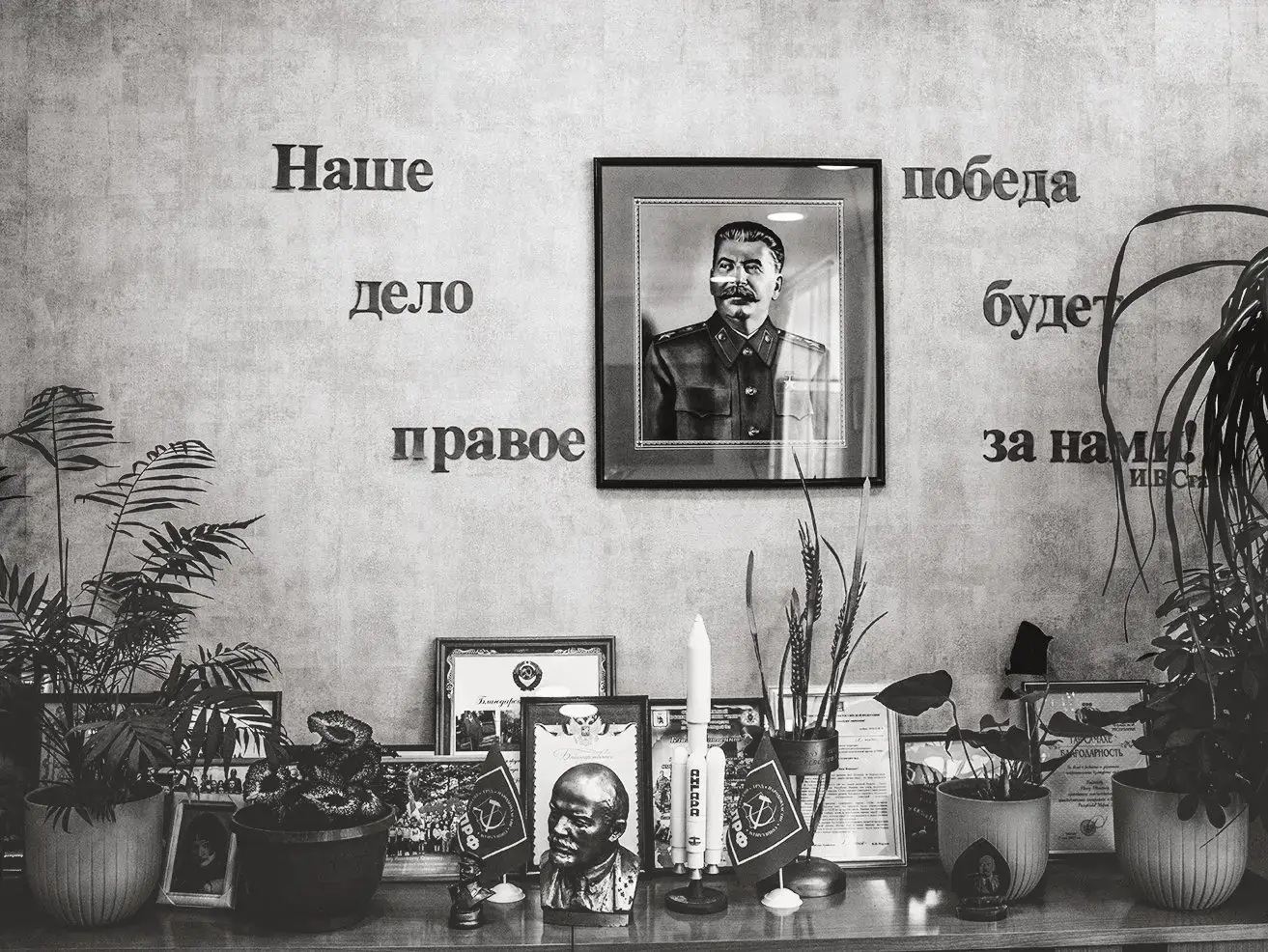
While in Kazan, I was invited to lunch by Farid Khairutdinov, a forty-eight-year-old businessman who had been referred to me as a “very influential Tatar in town.” Messaging over an encrypted channel, he had promised me an interesting conversation. When I arrived at Tatarskaya Usadba, a renowned local restaurant, I found him waiting for me in a private room with Mansur Hazrat Jalaletdinov, a mullah at the Marjani Mosque, the only one active in Kazan until 1990, after which about a hundred more sprang up. Khairutdinov told me that they had recently, at this very table, hosted Dmitry Medvedev, the former Russian prime minister and president, now deputy chairman of the Security Council. He then explained that he considered me “an enemy,” and said that no one wanted to meet with me or answer any of my questions. I was better off visiting a museum, he added. He had served in the FSB, he reminded me, and the mullah nodded along, clearly pleased.
That said, in a demonstration of Russian Tatar hospitality, they offered me an unforgettable lunch: twelve courses and three hours of conversation that was as absurd as it was instructive. They claimed that, in the Tatar language, “there is no word for retreat”; that the Tatars had been the best archers under Peter the Great; and that Mikhail Kutuzov, the general who defeated Napoleon, had been a Tatar. I pointed out that Kutuzov was the one who put down the Tatar resistance in Crimea in the late eighteenth century. “In fact, he lost an eye,” said Khairutdinov, and the mullah nodded. “We love to wage war. Am I right, Mansur?”
“It’s true,” he said. “We also fight against our demons.” I hoped to pursue the topic, but Khairutdinov changed the subject: “Sanctions have united us even more as a people.”
As the skewered lamb arrived, Khairutdinov said that before the war I would have been eating “s--t lamb from New Zealand,” but that this meat, tender and tasty, was Russian. Not only that, but up until yesterday the lamb had been grazing just a few miles away. He had raised it himself, he claimed. His business was in organic lamb and goose meat. He had opened stores all over Tatarstan. “There’s no competition, it’s amazing,” he said. “Just think, we used to import geese from Romania and France. Now I export goose legs and cured meat to Turkey.”
I asked why they hadn’t raised lamb and geese before the war, or why Russia, with all its intelligent and industrious entrepreneurs, produced so little and imported almost everything without generating significant income outside of the oil and gas industry. The mullah looked me in the eyes and told me that this was precisely the Russian genius: “Buying without producing,” he said. “Why should I make a bicycle if I can just buy one? I spend less money. Easy.”
More than thirty years ago, I wrote about the first stirrings of conflict from the beaches of Yugoslavia, which was then collapsing. I remember an orchestra of elderly musicians playing the foxtrot just for me, the only guest at a grand hotel on the isle of Rab. At the time, mortars were falling and people were dying just a few miles from the Dalmatian coast. Here along the Volga, war and death felt like spectral presences. People danced to techno and indulged in cocktails with improbable names: Hiroshima, Russian–Japanese War, and Drunken German. In almost a month of traveling, I saw only four bombers, passing over Tver, near the source of the Volga; felt the rumbling of fighter jets just once, in the low course of the river; encountered a few unarmed soldiers on leave; and saw a column of twenty trucks with tanks covered by tarps probably setting off for the front, hundreds of miles away. The rest was Russia as usual. But an unusually dynamic Russia, to be sure. I saw construction sites and cranes operating in the suburbs, buildings and churches being restored, significant repairs being made to the federal roads (although the famous potholes were still there), workers installing new pipelines, teams of gardeners in the parks, diligent garbage collectors emptying trash cans. Cars flooded the streets each weekend, when Russians went out to their country homes.
Was this fatalism? Indifference? Or arrogance, as Piotrovsky had implied back at the Hermitage? I struggled to find room in hotels or on ferries, all of which were overflowing with tourists forced to give up on the Mediterranean and make do with the Volga. Take Tatiana, the middle-aged manager of a supermarket chain. When I met her on a ferry in Yaroslavl, she wore a Panama hat, Gucci sunglasses, and capri sandals; she was heading downstream, to the same dacha where she had spent her summers as a girl. “I’ve had a boat docked in Mykonos for three years—who knows when I’ll see it again,” she told me. “I’m getting to know my river again. I’m running into friends I haven’t seen in thirty years. An interesting vacation.” I told her she looked a bit sad and resigned. “Russians have been sad and resigned for thousands of years,” she replied. “It’s how we stay resilient. I’m against this war, but I can’t do anything but wait, like everyone else. They manipulate us with artificial ideas. Garbage. But the West has been humiliating us for too long. Don’t we also have a right to be who we want to be without feeling like barbarians?”
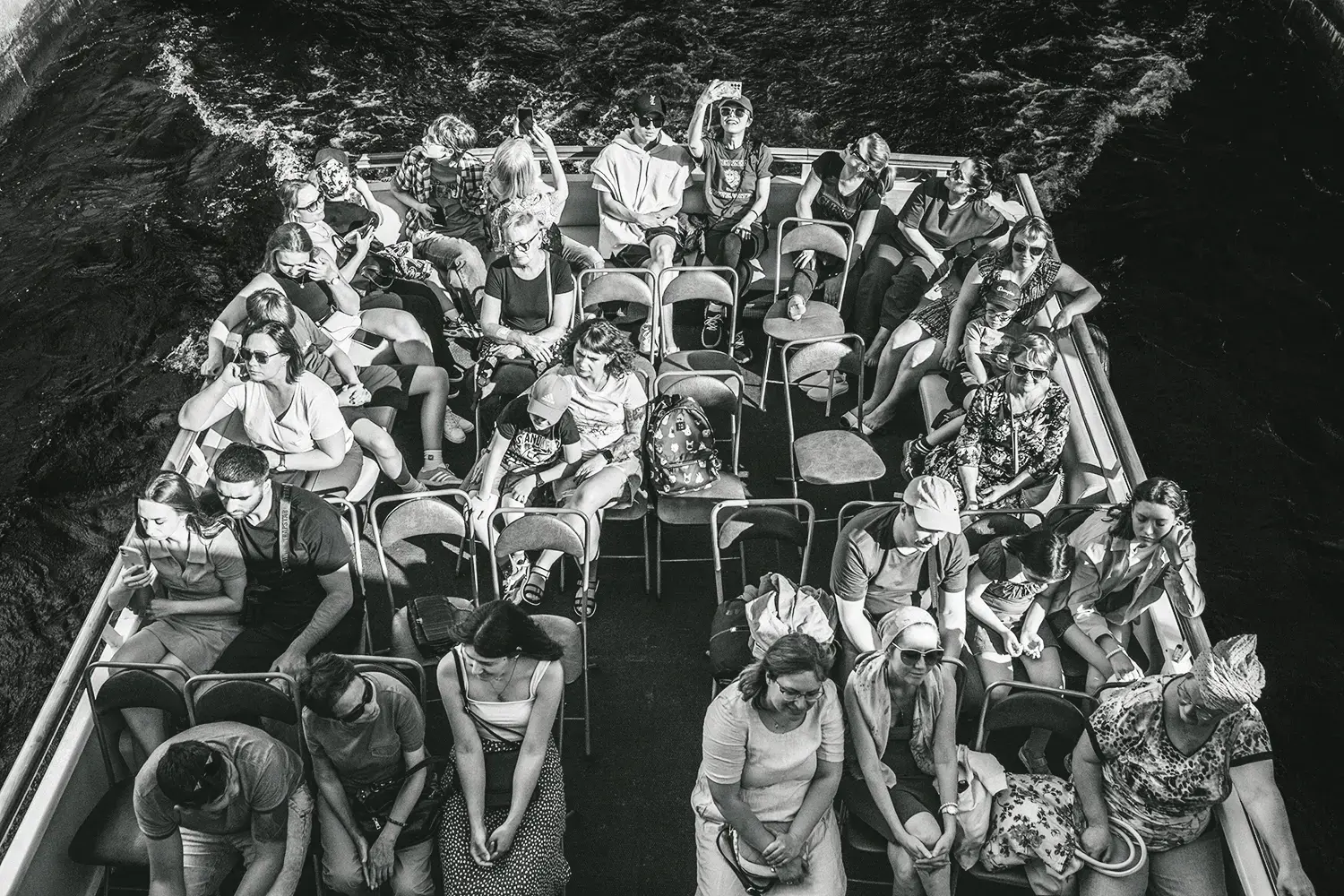
To think that the anti-Western ideas coursing through the country’s veins are simply the fruits of regime indoctrination would be to overestimate Putin—and to ignore what has driven Russia throughout its history, at least since the time of Peter the Great: a fascination with the West, paired with a proud and slightly overbearing defense of its own vast territory and resistance to assimilation. Russians have always vacillated between wanting to be included and fearing contamination or corruption, from harboring an inferiority complex to delusions of grandeur. It’s a clash that could be understood in terms of the intellectual conflict between the pro-Western Turgenev and the Slavophile Dostoevsky. Unfortunately, we’re no longer cruising at that altitude. There is arguably even less debate today than in the days of the USSR, and it’s clear that Russians are now more fully in a Dostoevsky phase: Their desire to lock themselves in a small but boundless world is reemerging, even among those who reject Putin and the Orthodox Church’s revanchist narrative.
I met a woman named Anna, for example, who described herself as an “anti-establishment, pacifist, pagan environmentalist,” and said that “we must be zombies to be killing our own brothers.” Yet she defended “family values” and “love of the ancestors.” Her priority, she said, was to “preserve Russian tradition.” She rejected “modern Western culture where anything goes and everything is easy and fun. Because it’s obviously a sham.” She went so far as to say that it’s people like her “who keep old Russia in their hearts, who are the ones who safeguard the roots of Europe.” Her hair was as long and blond as grain, her eyes emerald-green, and she wore traditional necklaces and a long jade dress. She was thirty-four years old and lived in the “Jamaica of the Volga,” at the foot of the Zhiguli—the only mountains in the Russian plains until the Urals—which plunge into the river and create incredible botanical effects, including the growth of wild marijuana. Volunteers come from all over Russia to harvest it. “Memorable parties,” Anna assured me, “but now the government has practically banned non-official gatherings, it’s like being in jail.” She told me that she is a shamanic healer, even if her official title is nurse. “If I didn’t have four children I would have been sent to the Donbas for sure,” she said. Her partner composes and plays Volga dub, a kind of Russian reggae—the soundtrack of the pacifist pirates of the river.
To reach their secret island hideout, I set out after sundown on a ramshackle raft made of pallets and surfboards. I was hosted by locals named Shukhrat and Albert: They had christened the island “Shubert.” Their friendship was changed and deepened by the war—Shukhrat lost a son, Albert sent his to Sweden. They had decided to abandon reality, taking over a strip of sand that magically emerged from the Volga in the spring. They camped out with their families and were gradually joined by other fugitives. Thus began an independent community with its own rules, foremost of which is to avoid the news. They hold meetings, yoga classes, meditation sessions. They sing antiwar reggae songs, using only traditional instruments such as balalaikas, domras, and bayans. Every Friday night, friends and musicians arrive from Kazan, Samara, and Tolyatti and put on a music festival. “We’re not distancing ourselves from the world,” said Albert, a former security systems engineer, “but creating our own separate world. This is our country now, based on authentic Russian values. Everything is scary out there.”
But Shubert Island’s remoteness hadn’t assuaged all his concerns. He had established a special relationship with two Ukrainian YouTubers who spoke Russian and was planning on biking out to visit them in the Donbas during that fateful February 2022. “They left me voice messages asking if I was their enemy now and why were we bombing them and killing them,” he told me. “I still don’t know how we ended up on the other side—it’s terrible. I can only cry, but my mom used to say that boys don’t cry.” These were the only tears I saw on my voyage.
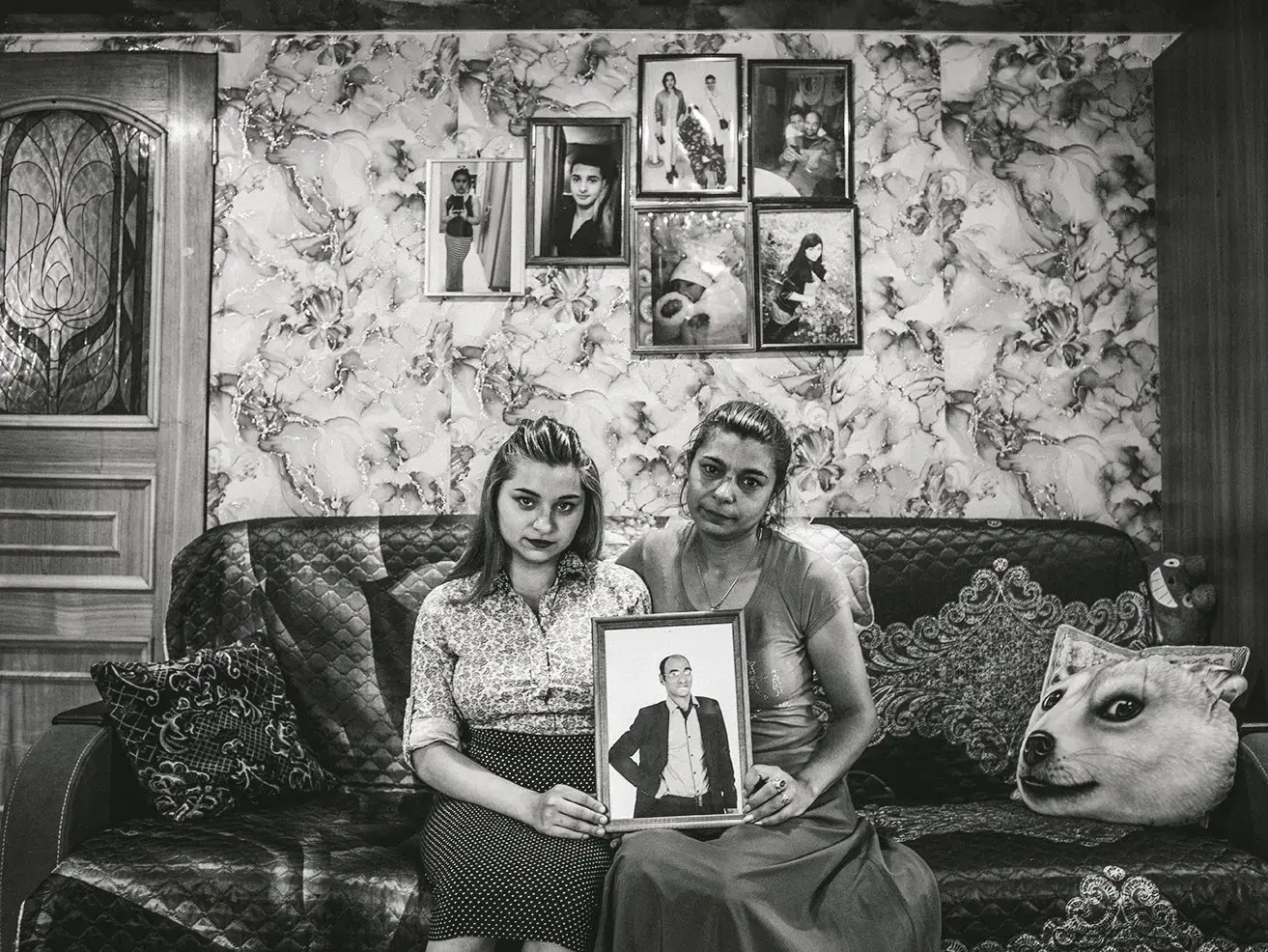
One Friday evening in Nizhny Novgorod, the birthplace of Maxim Gorky, I ended up on the main thoroughfare alongside the Kremlin, where I was almost trampled by a horde of drunken youths. The bars were overflowing with people dancing on the sidewalks, drinks in hand. The façade of a six-story building was covered with the letter Z, a symbol of support for the war. I was walking with Artjom Fomenkov, a historian and political science professor. I asked what he thought of the scene, of the unsettling contrast between the partiers and their peers being sent to the front. “Those fighting aren’t from big cities, but from small towns,” he explained. “The most downtrodden places,” that is, where they only enlist for the money. “It’s unlikely that the bulk of the urban population would feel directly affected by the war.” He thought for a moment and added, “and that’s why they go on living like that. They’re not involved, and so they do the same thing they were doing two years ago, one hundred years ago, two hundred years ago—marinating in their despair.” This is what I would hear referred to as the “Russian syndrome,” which is a mixture of nostalgia, melancholy, and affliction. “Putin is just the latest to exploit this passive attitude,” he said. “Remember, Russians are agents of their destiny, not victims.”
But just five hundred meters from the chaos, we encountered a sobering scene. Osharskaya Ulitsa is still known as the brothel street, because of its reputation in Gorky’s day. A building that once served as a brothel now supposedly hosts military offices. Anyone dragged in there at night has a high chance of being sent to a training camp the next morning, and then to the front. Fomenkov seemed to reconsider his earlier comments. “The kids you saw are actually terrified, they drink much more than before,” he said. “They know not to be found in certain places alone, drunk, and without a solid alibi, or at least an important last name.”
The next day I ended up on a nameless street, in the living room of a blue cottage besieged by skeletal hens and the carcasses of old cars repurposed as chicken coops. This was the home of Pavel, who died in the Donbas in the fall of 2022, only forty days after enlisting. His eighteen-year-old daughter, Zarina, was pregnant, and looked at me with astonished eyes, green and yellow like the grass of the steppe in summer. She was sitting on a burgundy couch next to her mother, Valentina, who looked worn out. They told me that Pavel had been a taxi driver and had gone into debt. One night, he came home drunk and said he had enlisted. He showed Valentina the contract, for just over two hundred thousand rubles a month. Driving a cab had earned him fifty thousand rubles at most, and some months almost nothing.
The ceiling was low and had been painted to resemble the sky. On the walls hung pictures of the kids—one showed them swimming in the Volga with their father. Then there was Pavel, beaming with his new weed wacker. “He was a good man, respected,” Valentina said. “I couldn’t stop him. He did it for his three children, to pay off the mortgage.” Ten days of training and he left. Apparently he had stepped on a mine. “They sent him ahead to check out the terrain. But we’ll never really know,” said Zarina, biting her lip. Two military officers had arrived on their doorstep to deliver Putin’s form letter and a medal. Valentina assured me that people were there for her—even neighbors whom she hadn’t spoken to in years had come by with bread and vodka. She and Pavel had loved each other, she told me, but they had never married. Valentina was now suing his mother to obtain the millions of rubles the state provided to compensate the families of the fallen. “What was he thinking?” she said. “Pavel had his own ideas. He used to say it was time to stick it to everyone who left the USSR. But he left to make a few bucks, so in the end he was just a mercenary, right?”
In the corner, near the stereo and CDs, lights illuminated a small shrine flanked by the Russian flag: Pavel’s accordion, his straw hat, fake sunflowers, images of the Madonna, whom he worshiped, and the teddy bears he had bought Zarina. And then, smiling above it all like a kindly uncle, Stalin. “His beloved Stalin,” Valentina said.
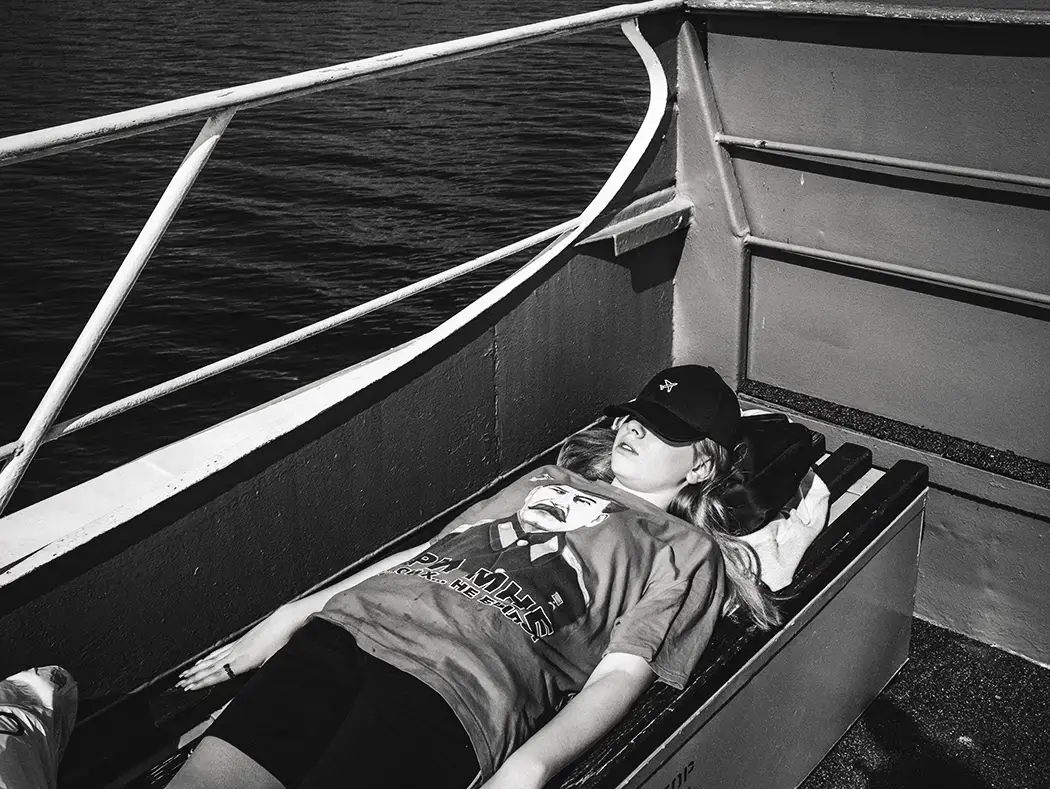
Stalin, as far as I could tell, had become the symbol of the summer, a totemic figure along the lines of Che Guevara. Lenin may be one of the most common statues in the world, with seven thousand in Russia alone—but it is no longer Lenin’s arm that points to the future. Stalin is experiencing a Second Coming, his name recurring like a mantra. He even has his own namesake sausage brand. His biggest sponsor, perhaps, is Putin, who knows that by invoking him he is pulling on a magic string that will reawaken secret dreams of glory.
“Putin can’t compare himself to Lenin,” the historian Dmitry Rusin told me. “He was too intellectual and complex in these days of easy approximations. It’s too European.” Rusin is a professor at Ulyanovsk State University. In 1970, they built an enormous Lenin memorial in the city center. “Putin prefers to be compared to Stalin, just as Stalin drew his ruthless idea of Russian power from Ivan the Terrible,” said the professor as we approached the memorial. “Not a European idea, but an Asian one, that doesn’t hold the life of the individual in consideration. I find this return to the cult of Stalin, especially among young people, horrifying. I feel a catastrophe coming.” The fountain in front of the complex had run dry. “They closed the complex for renovations five years ago,” Rusin said. “It was supposed to reopen in 2020, now they’re saying 2025. But no funds are coming from Moscow. They want to make Ulyanovsk poor.”
Volgograd is a different story. Putin wants to change its name back to Stalingrad, the better to exploit the symbol of the battle. “We are again being threatened by German Leopard tanks,” the president said in February 2023, inaugurating a new monument to Stalin at the museum dedicated to the two-hundred-day siege, when more than a million Soviet and German soldiers were reported dead, wounded, missing, or captured. “Again and again, we have to repel the aggression of the collective West.”
Yet Samara, five hundred miles north of Volgograd, is where the ghost of Stalin really makes one realize just how little the outside world understands about Russia. The city is located at the point where the Volga veers east, as if attracted by the pull of the Urals. The city is generally known as the Russian Chicago, because of its great industrial vitality and popularity with merchants and criminals. But in the summer, Samara becomes the Saint-Tropez of the Volga, with elegant beaches and a fashionable riverside promenade that is second only to Sochi’s. And just like Sochi, it seems to be a destination for hardcore Putin supporters. Bourgeois kids traverse its streets on scooters, wearing expensive American sneakers and the hottest T-shirt of the season—one bearing Stalin’s face and the phrase if i were here, we wouldn’t be dealing with all this s--t.
Stalin built a secret bunker under an old Communist Committee building in town in 1942, just after the narrow Soviet victory at the Battle of Moscow. These days it’s a pilgrimage destination. I went on a tour of the bunker, in which at least half my group consisted of people in their twenties. We descended to find the control room and apartment for the head of the USSR. The bunker was never used, but the guide explained that it was updated during the Cuban Missile Crisis and again after the annexation of Crimea in 2014. Today it can hold up to six hundred people for five days and “even gets cell phone service.” Andrei, a twenty-four-year-old electrical engineer who was visiting from Moscow with three friends, spontaneously told me of Stalin that “he was a winner.” We were in front of an original military map of the Soviet counteroffensive. “For us young people, Stalin is number one. We must fight evil like during the Great Patriotic War.” Did any negative associations come to mind? “They say a lot of things, but what matters is the results,” he said. “I think there were more deaths in the Nineties with the gang wars and alcohol. That was our first experience with democracy—the worst period of our history.”
In this second summer of what Andrei called the “war on evil,” even the most zealous popes indulge the Stalin worship, despite his confiscation of Orthodox Church assets and the fact that he has turned many of their cathedrals into prisons, factories, and army barracks. It was Piotrovsky, at the Hermitage, who suggested I meet a young priest named Mikhail Rodin, whom he called “an emerging voice.” He lived in Balakovo, Piotrovsky added, “a place forgotten by God.”
Father Rodin, who is forty-four and has four children, belongs to the Russian Orthodox Old Believer Church, which was born out of a seventeenth-century schism with the official Orthodox Church. A long history of repression and semi-clandestine masses followed. But today, the conflict with the main church, presided over by the crusading Patriarch Kirill of Moscow, seems to have subsided, with both factions supporting Russia’s sacred mission in Ukraine.
I arrived in Balakovo in the evening, the smell of ammonia in the air. Though the city revolved around two of the biggest power plants on the Volga, all its roads were dark. The only sign of life came from the Lucky Pub, which was hosting a concert by the Kiss, a popular local rock band—all the kids seemed to know their songs. I entered and felt like I was in the Midwest; there were pool tables, darts, French fries in baskets with checkered paper, and a sign reading make love not war.
Batyushka Rodin, who speaks excellent English, said that his church near Balakovo’s squalid industrial zone—a luxury lodge with fragrant pine logs, an oven to make the communion bread, icons donated by parishioners—had been financed by one Robert Stubblebine, an American native who relocated to Moscow. He’s known as a VP and early shareholder of Yandex, the Russian Google, started by his business partner Arkady Volozh, an oligarch who has called the war “barbaric” (probably just in an unsuccessful bid to be taken off the list of sanctioned billionaires).
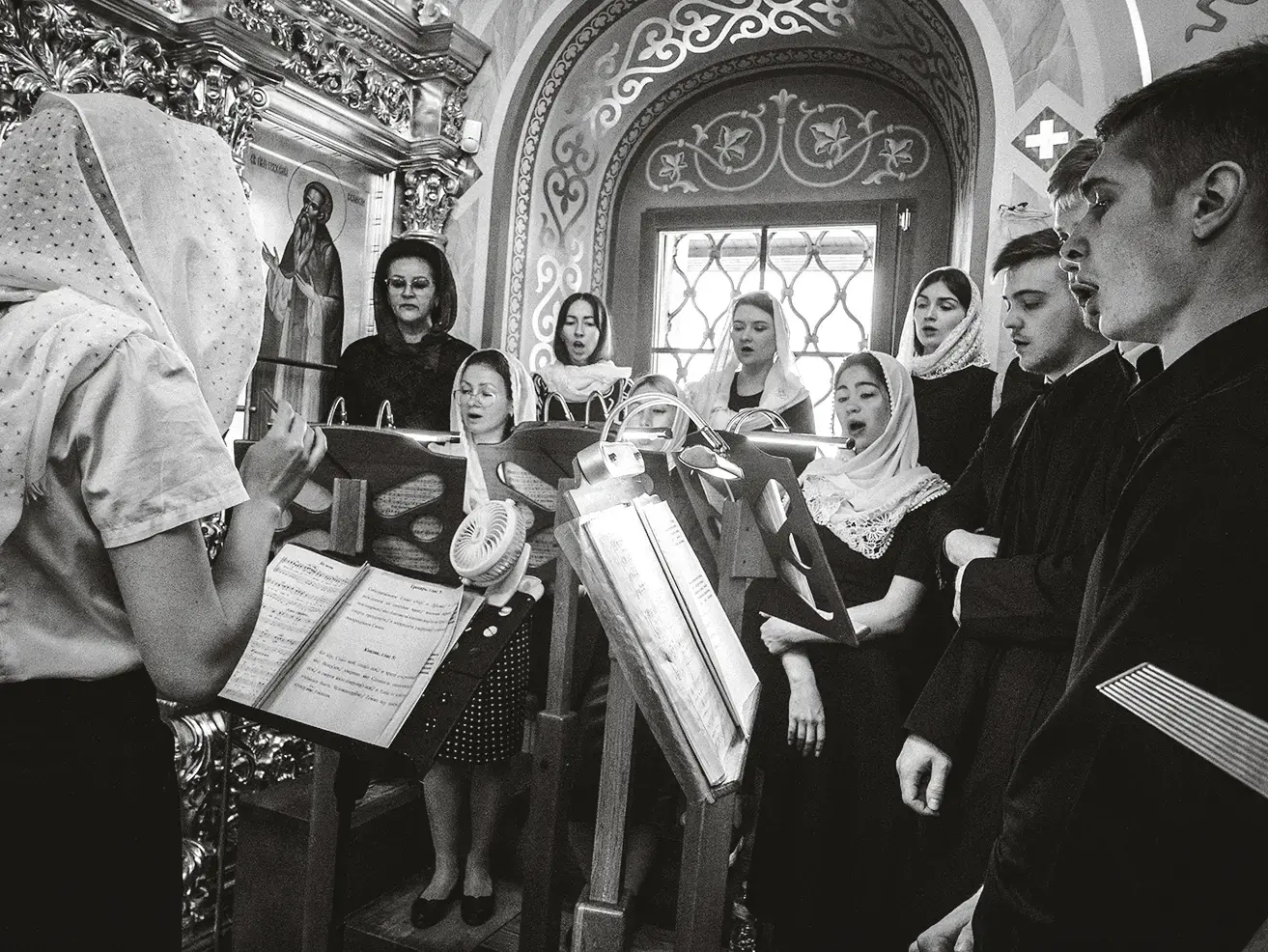
Rodin had other ideas. “The war is the last opportunity to bring salvation to the human soul,” he said with a beatific smile. “In the Book of Revelations, John the Apostle wrote of these last trying times for the human race, when everyone would have to choose their own path: They will either stay with God or go forth to great pain and suffering forever.” His tone didn’t change when I asked about Stalin’s resurgent popularity. “I don’t want to judge, because God can’t be removed from the hearts of Russians,” he said. “No one called Stalin for help, no one called the Party for help. Everyone cried out to God!”
I know Russian priests fairly well—they tend to be rough and arrogant. Rodin was different, at once modern and archaic. He uses social media and medieval mannerisms. He has traveled a bit, but for him there is no place like Russia. I asked him what being Russian meant to him. “We’re influenced by the immense nothingness around us, and by the harsh climate,” he said. “In a land like this, you have to have an objective, a dream. We Russians need to have something big to strive for. We dreamed of communism, equality, and of a life where no one is exploited by anyone. Every person the same as the next.” He went on: “If Russians believe in something, they believe until the end. They believe in God. They’re ready to die for their faith. They believe in communism. They’re ready to die for that. They believe in Russia and they’re ready to sacrifice themselves for Russia.”
Even the atomic bomb, batyushka?
“Of course,” he replied quickly. “We’re ready to sacrifice ourselves. Because if we don’t win, we’ll burn it all down. If we can’t achieve this bright future, then what’s the point in living?” He grew more heated. “Our president is saying what everyone is thinking. If we don’t have the Russia we want, we’re ready to martyr ourselves, sacrifice ourselves and the whole world if it’s unjust and evil. There’s no need for a world like that.”
I was back out on the street when I saw that I had a voicemail from Albert, from Shubert Island. He had composed a new reggae song: “At sunset the Volga is bathed in pure light,” he sang, “when illuminated by love, my heart is the same.”



